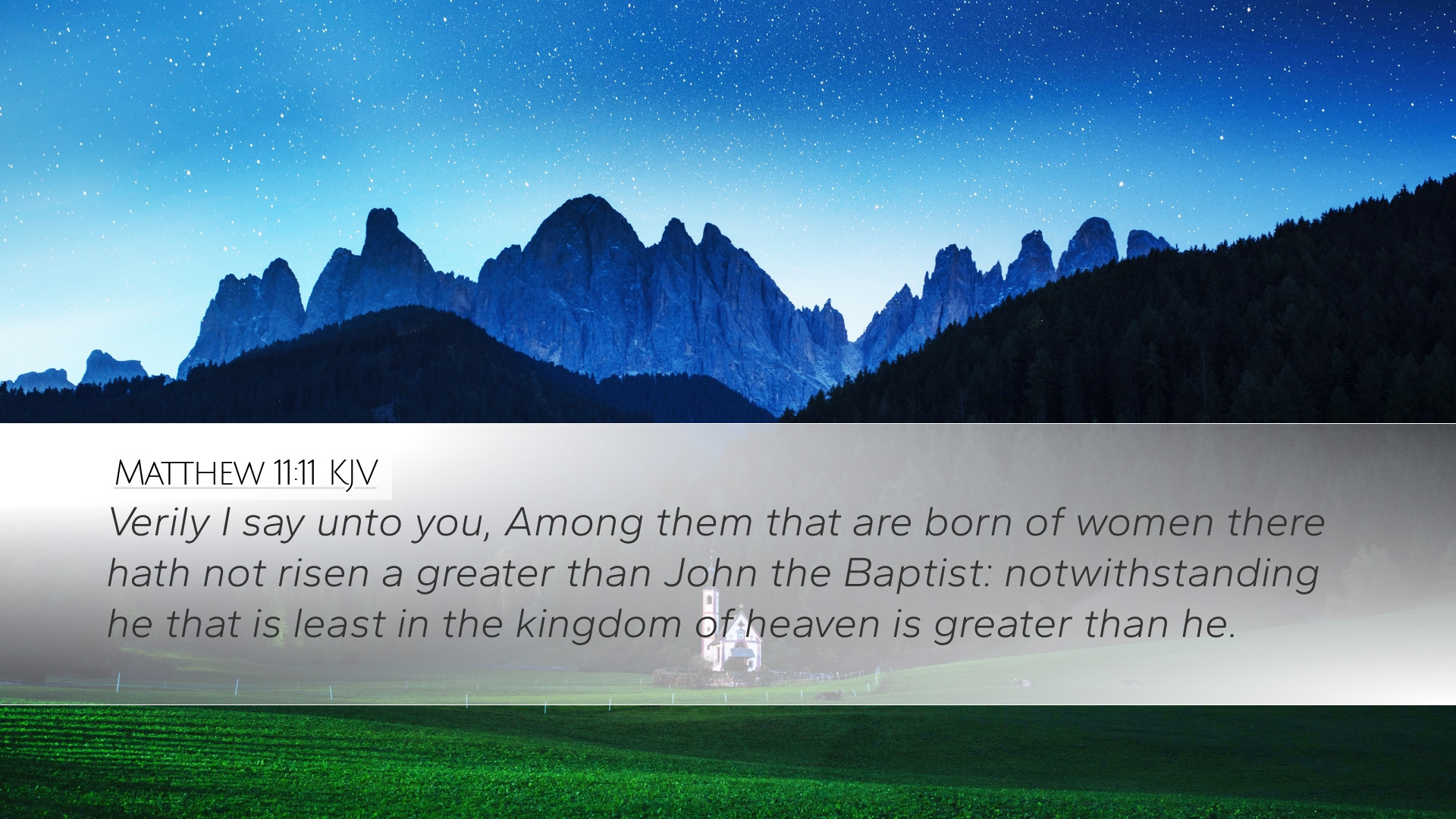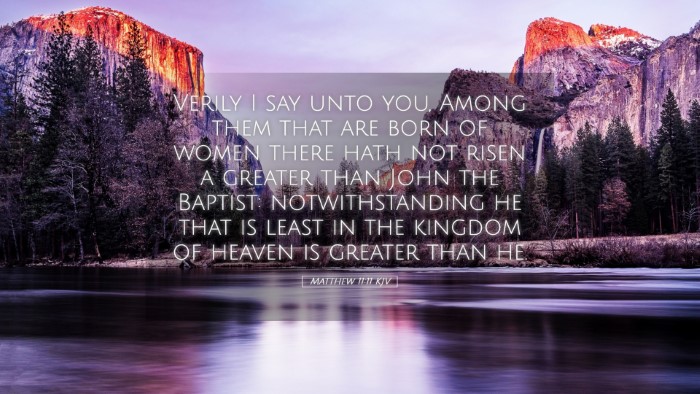Commentary on Matthew 11:11
Verse: "Verily I say unto you, Among them that are born of women there hath not risen a greater than John the Baptist: notwithstanding he that is least in the kingdom of heaven is greater than he."
Introduction
This verse serves as a pivotal point in the ministry of Jesus, reflecting His endorsement of John the Baptist while simultaneously delineating the transformative impact of His own ministry. The profound statement about John the Baptist underscores his unique role as the forerunner of Christ and invites a deeper investigation into the theological implications of greatness in the Kingdom of Heaven.
Textual Analysis
In this passage, Jesus articulates a startling contrast between John the Baptist and those who will be part of the coming Kingdom. The phrase "born of women" emphasizes the humanity of John, placing him in the lineage of all prophets. Matthew Henry notes that this illustrates John's significant role in God's redemptive plan, yet highlights the idea that the new covenant established by Christ surpasses the old.
Insights from Matthew Henry
Henry elaborates on the concept of greatness within the Kingdom of Heaven. He states that although John is the greatest of those born of women, his ministry was limited to the old dispensation. With the coming of Christ and the establishment of the New Covenant, a new spiritual reality unveils where believers rise to a greater status through faith. This idiosyncratic blessing demonstrates that the least in the Kingdom of Heaven has a relationship with God that transcend earthly measures of greatness.
Albert Barnes' Commentary
Barnes emphasizes the idea that John the Baptist, despite his significant role as a prophet, is not a member of the Kingdom of Heaven. He recognizes that while John functions as a bridge between the Old Testament and New Testament, the least believer in Christ enjoys privileges that exceed those of any former saints. The coming of Christ marks a shift where believers receive the Holy Spirit, full sonship, and direct access to God. In this light, the greatness of John must be understood in context—the dawning of a new era under Christ’s lordship changes the very dynamics of spiritual greatness.
Adam Clarke's Interpretation
Clarke provides a historical overview, noting the prophetic tradition from which John arose. He observes that, while John’s role was crucial, Christ’s message extends beyond mere prophetic anticipation. The ‘least in the kingdom’ signifies the invitation to all believers to partake in a divine relationship characterized by grace, love, and spirit. Clarke posits that this positions believers not merely as followers, but as citizens of a heavenly kingdom, endowed with dignity and purpose unique to New Testament theology.
Theological Implications
The theological implications of Matthew 11:11 extend into several dimensions:
- Superiority of the New Covenant: The statement illustrates that the arrival of Jesus and the gifting of the Holy Spirit redefine the relationship between God and humanity.
- The Universal Call: The calling of every believer into the Kingdom underscores the inclusivity of grace, transcending human merit.
- Value of All Believers: This verse affirms the value of all believers in Christ, regardless of their earthly status or accomplishments. It emphasizes that spiritual vitality and relationship with God determine true greatness.
Pastoral Application
This verse encourages pastors to teach on the nature of true greatness in the Kingdom of Heaven. It invites reflection on how congregants perceive their worth and spiritual value based on their faith in Christ rather than societal standards.
As leaders, pastors can use this passage to craft messages that instill confidence in the worth of every believer, affirming that everyone, regardless of their earthly stature, has a significant role in the economy of God's Kingdom. This can lead to fostering an environment where individuals are encouraged to express their gifts and find their niche in ministry.
Conclusion
Matthew 11:11 serves as a profound declaration of God’s active role in the world through the life and ministry of Jesus Christ. In juxtaposing John the Baptist and the least in the Kingdom of Heaven, it encapsulates the revolutionary nature of the Gospel. The insights derived from the commentaries of Matthew Henry, Albert Barnes, and Adam Clarke collectively unfold a deeper understanding of the text, emphasizing the transformative grace available through Christ. Thus, it challenges believers, pastors, and theologians alike to reevaluate their understanding of greatness within the scope of God’s Kingdom.


